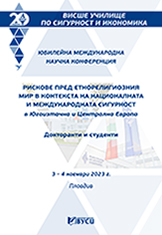Неоосманизмът и неговите последици за етнорегионалните отношения в Югоизточна Европа
Neo-Ottomanism and its implications for ethno-regional relations in Southeast Europe
Author(s): Dzhansu Asan Danadzhieva
Contributor(s): Georgi Lyubenov Manolov (Editor)
Subject(s): Islam studies, International relations/trade, Security and defense, Military policy, Sociology of Culture, Inter-Ethnic Relations, Globalization, Geopolitics, Politics and Identity, Identity of Collectives
Published by: Висше училище по сигурност и икономика (ВУСИ)
Keywords: Neo-Ottomanism; Turkey; cultural diplomacy; Balkans; Muslim communities; soft power
Summary/Abstract: This paper analyses neo-Ottomanism as an ideological current that aims to revive Turkey's Ottoman heritage, which seeks to combine modern statehood with traditional values and regional influence. Neo-Ottomanism stresses Turkey's importance as a worthy successor to the Ottoman Empire and its role as a bridge between East and West. In order to improve its international standing, Turkey needs to rethink and publicly acknowledge its historical and geographical identity. The approaches presented highlight Turkey's ambitions to rebuild cultural ties and establish new economic and political relations in the region. While neo-Ottomanism can contribute to greater regional cooperation, it also brings challenges related to historical grievances and the need to realign political alliances.
- Page Range: 6-11
- Page Count: 6
- Publication Year: 2024
- Language: English, Bulgarian
- Content File-PDF

